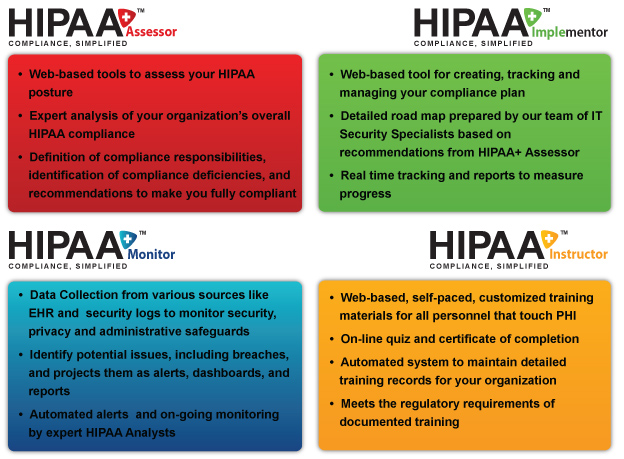|
HIPAA ComplianceWhat is HIPAA Compliance?
HIPAA is an acronym for Health Insurance Portability and Accountability Act of 1996. It is a federal law that has been amended to the Internal Revenue Code of 1996.It was designed to improve portability and continuity of health insurance coverage in the group and individual markets. · Title–I HIPAA Compliance - HIPAA protects health insurance coverage for workers and their families when they change or lose their jobs. · Title-II HIPAA Compliance - The Administrative Simplification (AS) provisions requires the establishment of national standards for electronic health care transactions and national identifiers for providers, health insurance plans, and employers. The AS provisions also address the security and privacy of health data. The standards are meant to improve the efficiency and effectiveness of the nation's health care system by encouraging the widespread use of electronic data interchange in the US health care system. More specifically, HIPAA calls for: · Standardization of electronic patient/ health, administrative and financial data · Unique health identifiers for individuals, employers, health plans and health care providers · Security standards to provide physical, technical and administrative safeguards to protect the integrity, availability and confidentiality of health information. · Privacy standards to ensure administrative and physical safeguards to protect the privacy and confidentiality of health information, and to protect against unauthorized access. Since the passage of HIPAA in 1996, Organization must be able to provide assurances that the integrity and confidentiality of the electronic protected health information (PHI) that organization will collect, maintain, use or transmit is protected—and not just against the risk of improper access but also against the risk of interception during electronic transmission. Under HIPAA there are specific standards that all health care organizations are required to adhere to. To achieve HIPAA compliance, health care organizations must implement physical, technical and administrative safeguards. All this will ultimately ensure the integrity and security of health care information. HIPAA Product & Services · Compliance Risk Management · EDI Clearing house Capabilities · HIPAA Security Audit · HIPAA Security Audit Process · HIPAA Security Plan Development · HIPAA Security Plan Implementation · Technical Security Mechanisms: Encryption · HIPAA Security Plan Maintenance What is the significance of HIPAA compliance? The act provides patients with increased control over how protected health information is used and disclosed. Organizations must standardize policies and procedures to ensure patient confidentiality. Benefits of HIPAA Compliance · Fines and criminal penalties avoided · Lower liability potential · Lower risk of public exposure · Consumer / Industry confidence · Streamlined process workflow · Increased efficiency · Reduced administrative expenses · Increased data efficacy · Enhanced immunity to disaster situations · Lower long-term costs (ROI) The road to HIPAA compliance can be long and confusing, but the rewards are worth the effort. Below are examples of how Circadian Force can help an organization achieve compliance in various areas. Success with HIPAA What will make an organization successful in their approach to HIPAA? This will be influenced by several factors, a few of which are listed below: · Understanding and acceptance of HIPAA regulations by executive leadership · Willingness to accept change and invest in a solution · Readiness to implement process improvement strategies · Readiness to overcome the impact HIPAA compliance may have within the organization · Recognition of new technologies to meet HIPAA regulations and the creation of a plan for applications that are not HIPAA-compliant · Buy-in for HIPAA compliance across the entire organization For Whom is it applicable: Directly Affected: All organizations that directly maintain and transmit protected health information. These include health care providers, hospitals, physician practices, dental practices, health plans, laboratories, health care clearinghouses, pharmacies, etc. Indirectly Affected: All third party vendors and business partners that perform services on behalf of or exchange data with those organizations that directly maintain and/or transmit protected health information. Examples are accountants, lawyers, medical answering services, consultants, billing agencies, etc. |



